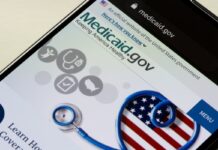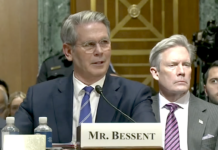
Georgia expects to receive several hundred thousand doses of COVID vaccines this month for its initial distribution, the state Public Health commissioner said Tuesday.
The first groups to get shots will be health care workers and residents and staff of long-term care facilities, said the commissioner, Dr. Kathleen Toomey, at a news conference at the state Capitol.
The first deliveries of vaccines, though, will not be enough to vaccinate everyone in those two groups, Toomey acknowledged.
With Public Health guidance, hospitals, nursing homes and other facilities will make decisions on which staff will get vaccinated in the early distribution.
Toomey cited priority for people such as respiratory therapists and ICU personnel, who often treat COVID patients, versus workers not involved in direct patient care. “Some individuals within hospitals are more at risk than others,” she said.
Hospitals are ordering vaccines, Toomey said. “We hope by certainly early January, I would think, we will have all health care workers covered.”
The Public Health system will be the backbone of the distribution effort, Toomey said.
Though it will take time, the U.S. vaccination program will be the key to bringing COVID-19 under control. Britain on Tuesday became the first Western nation to start its coronavirus vaccinations. (Russia and China have developed their own vaccines and have begun administering them.)
 Georgia officials say the state expects to receive some combination of the Pfizer and Moderna vaccines. Each will require a person to get two doses, three to four weeks apart.
Georgia officials say the state expects to receive some combination of the Pfizer and Moderna vaccines. Each will require a person to get two doses, three to four weeks apart.
The state will follow guidelines approved last week by a panel advising the CDC, Toomey said.
The Advisory Committee for Immunization Practices (ACIP) recommended that health care workers and long-term care facility residents to be first in line. Those people are “exceptionally high risk,” said Dr. Jose Romero, who chairs ACIP.
About one-third of COVID deaths in Georgia have been among residents of nursing homes, assisted living facilities and large personal care homes.
The Pfizer vaccine requires freezers that are extremely cold: minus 70 degrees Celsius (minus 94 degrees Fahrenheit). “We have those freezers available all over the state,’’ Toomey said, with special carriers provided by Pfizer.
The Moderna vaccine doesn’t require those deep freezers, and “that will be easier to transport,’’ she added.
People in rural areas will get similar access to people in metro Atlanta and other urban centers.
‘‘Our public health directors are in charge, and they’re looking out for their rural areas,’’ Toomey said.
Communication about vaccines will be vital for African-American and hard-to-reach communities, state officials say.

“It’s going to be a big undertaking,’’ Kemp said. “The limited amount of vaccine doses we will receive in the coming days will be going to the most vulnerable and those on the front lines of fighting COVID 19. The general public will not be able to be vaccinated for months.’’
That’s why Georgians must continue to follow safety guidelines, he said, including wearing masks, practicing social distancing and washing hands.
President-elect Joe Biden vowed Tuesday to get 100 million doses of a coronavirus vaccine distributed to Americans in the first 100 days of his administration.
Biden said getting vaccines to most Americans would be a costly challenge and called on Congress to designate funds for getting vaccine to the people who need it.
“This will be one of the hardest and most costly operational challenges in our nation’s history,” he said at an event to introduce his health team.
Don’t fear the shot, experts say
Some vaccine recipients may experience side effects, such as mild fever, arm pain or flu-like symptoms, Toomey said. “It’s to be expected.’’
A major challenge will be communicating the safety of COVID vaccines, because many people are hesitant about taking the shots. (Skepticism about vaccines in general has been an alarming public health problem in recent years.)
Sixty percent of people questioned in November said they would “definitely or probably” take the coronavirus vaccine if it were available today, up from 51 percent in September, according to a study published by the Pew Research Center.
 Pew said 39 percent of people polled said they definitely or probably would not take the vaccine, though almost half that group said they might change their minds if more information became available.
Pew said 39 percent of people polled said they definitely or probably would not take the vaccine, though almost half that group said they might change their minds if more information became available.
While an exact threshold is not known, Dr. Anthony Fauci, director of the National Institute of Allergy and Infectious Diseases, said recently that 75 percent to 85 percent of the population will need to get the vaccine to stop the spread of the virus, WebMD reported.
Kemp said he and Toomey will get the shots themselves as a way to reassure and encourage people in Georgia.
The governor acknowledged the rising number of COVID-19 infections in the state. “All our metrics are going up,’’ Kemp said, though he contended that Georgia is doing better than many other states.
The state Public Health website reported 5,700 new infections Tuesday, continuing a spurt of high numbers of daily cases.







